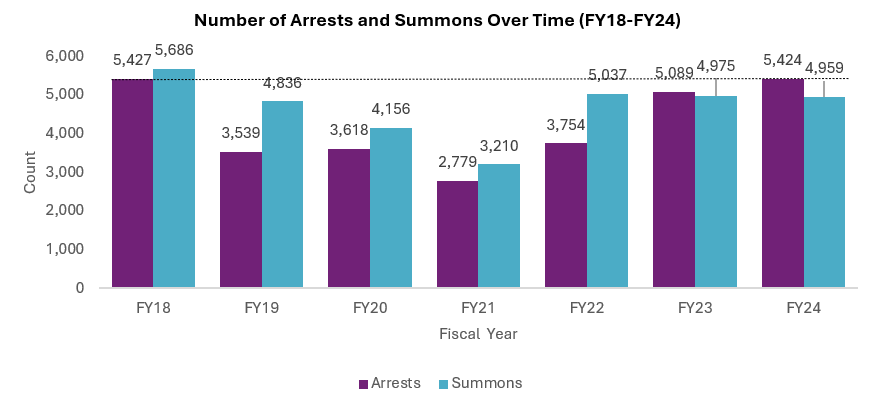- Office of the Child Advocate
Media Contact
Ari Fertig, Legislative and Communications Director
Boston, MA — The Juvenile Justice Policy and Data (JJPAD) Board released its annual report today, highlighting an uptick in the use of arrests and pretrial detention for youth in FY24. This increase in the use of physical custody is occurring despite the fact that the use of the rest of juvenile justice system, including total arraignments, has plateaued since FY23.
The number of arrests returned to levels seen prior to the FY18 passage of the Criminal Justice Reform Act (CJRA), the landmark criminal justice reform law that aimed to reduce utilization of the juvenile justice system. Data indicates that this increase is driven by arrests for misdemeanor offenses, which rose by 13%, compared to a 4% rise in arrests for felony cases.
The harmful effects of placing youth in handcuffs, in a police cruiser and, oftentimes, in police lock-up have been well-documented. This has led to a push, both nationally and in Massachusetts, to, whenever possible, rely on a court summons as the preferred method of bringing youth to Juvenile Court for alleged delinquent offenses rather than making an arrest.
For example, in Massachusetts law enforcement officers are trained that “a summons is the preferred method for bringing all juveniles to court, unless there is reason to believe the child will not appear upon a summons.” For the last two fiscal years, the number of arrests of juveniles has exceeded the number of summons issued to juveniles, reversing long-time trends.
Additionally, for the third year in a row, there was an increase in the number of detention admissions. There was a 17% increase in detention admissions between FY23 and FY24.
"Arrests and detentions can be deeply traumatic for youth, disrupting education, family stability, and mental health,” said Maria Mossaides, Director of the Office of the Child Advocate. “Massachusetts has long prioritized community-based supports to prevent system involvement, which improves outcomes for youth and public safety. We must expand these efforts to give young people the intervention and support they need to succeed."
Disparities Worsen: Black and Latino Youth Disproportionately Impacted
The report highlights ongoing and worsening racial disparities in our juvenile justice system, particularly at the “front door” of our juvenile justice system.
Data from this report indicates that racial and ethnic disparities are worsening as a result of a decrease in system use for white youth, and an increase in system use for Black and Latino youth. For example, from FY23 to FY24, there was a 14% increase in arrests for Black youth, an 18% percent increase for Latino youth – and a 2% decrease in arrests for white youth.
As previous JJPAD research has demonstrated, Black and Latino youth are more likely to be arrested – rather than issued a summons – for delinquent offenses than white youth. This is true even for misdemeanor offenses: in FY24, Black youth who are the subject of misdemeanor complaints were brought to the court via a custodial arrest 35% of the time and Latino youth who are subject of misdemeanor complaints were brought to the court via custodial arrest 34% of the time, compared to 28% of the time for white youth.
“This report highlights a reality we cannot ignore: racial disparities in the juvenile justice system are not improving,” said Melissa Threadgill, Senior Director of Policy and Implementation at the Office of the Child Advocate. “The numbers are trending in the wrong direction, and we must take systemic action to address these inequities.”
Recommendations
The report urges immediate attention to address these challenges, including fully implementing measures from the 2020 Policing Bill and implementing prior Board recommendations, including:
- increasing opportunities to divert youth away from the system
- addressing policies and practices regarding the use of an arrest for juveniles
- establishing guidance on the setting of pretrial conditions of release for youth in order to prevent detention admission.
“It’s been nearly half a decade since the policing bill passed,” said Threadgill. “Despite these efforts, the disparate use of custodial arrests for youth of color means that Black and Latino youth in Massachusetts who are alleged to have committed a delinquent offense are more likely to suffer the negative consequences and trauma of an arrest than white youth who are similarly accused. It’s time the state fully implements the measures in the policing bill and continue to address the disparities that exist in juvenile arrests across the state.”
The full report detailing the Board's findings and recommendations is available on the JJPAD website.
###
About the JJPAD Board
In April 2018, the Legislature passed An Act Relative to Criminal Justice Reform, which created the Juvenile Justice Policy and Data (JJPAD) Board under M.G.L. Chapter 119, Section 89. The Legislature charged the JJPAD Board with evaluating juvenile justice system policies and procedures, making recommendations to improve outcomes based on that analysis, and reporting annually to the Governor, the Chief Justice of the Trial Court, and the Legislature. The statute creating the JJPAD Board also placed a special emphasis on improving the quality and availability of juvenile justice system data.The Child Advocate chairs the JJPAD Board and the OCA provides staffing for the Board’s work.
https://www.mass.gov/juvenile-justice-policy-and-data-board
###

